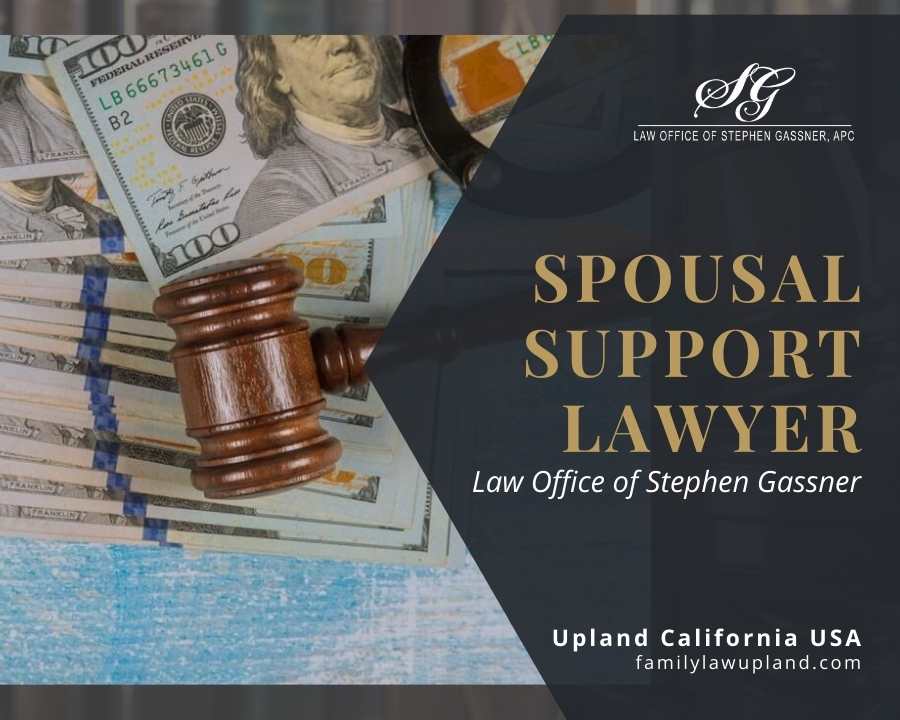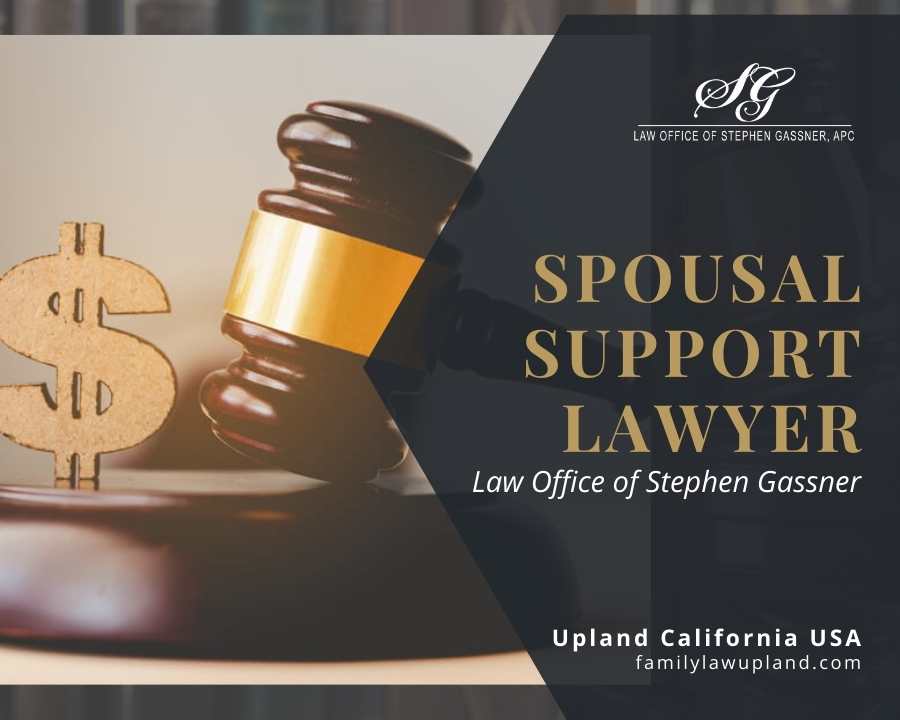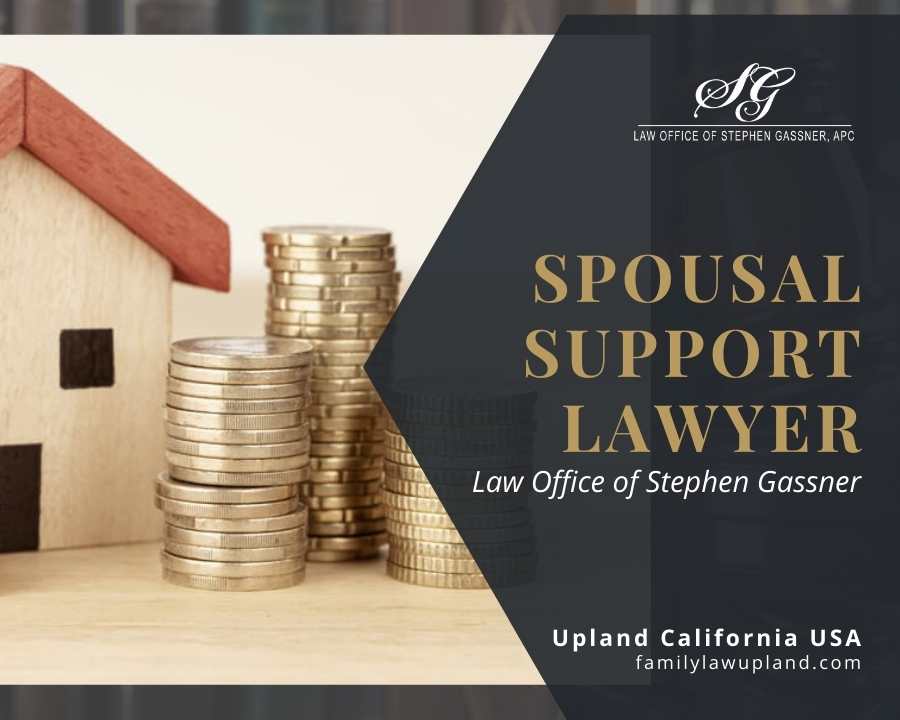Spousal Support - The Law Office of Stephen Gassner
Table of Contents
Toggle
When a couple splits or divorces, a typical issue is financial assistance. Transitioning from a two-income to a single-income home can be financially challenging. In addition, it may be challenging for spouses who work in the house to obtain a job that would support them or maintain their existing quality of life due to a lack of skills, education, or experience. Spousal Support Lawyer Upland CA
A person may seek spousal maintenance during a legal separation, divorce, domestic abuse, and annulment. Spousal assistance is accessible for spouses, domestic partners, same-sex spouses, and former spouses. Let the Law Office of Stephen Gassner help you get the best possible outcome in your spousal support. Schedule an appointment with our spousal support lawyer now!
What is Spousal Support?
Spousal Support, or alimony under California law, is intended to provide financial assistance to a spouse throughout the divorce process and for a period of time after the dissolution of the marriage. If you and your spouse are divorcing or in the process of divorce, both may put into writing an agreement that a specified amount of support will be given to the other for a particular length of time. Otherwise, if a spouse claims alimony as part of the divorce process in California, the court must decide whether to approve the request and, if so, the amount of support to be awarded. Even if you intend to reach a settlement agreement with your spouse, you need to understand how alimony works in California and the regulations that judges must follow when making judgments about spousal support. Spousal Support Lawyer Upland CA
Types of Spousal Maintenance
There are essentially two types of alimony in California: Spousal Support Lawyer in Upland CA
Temporary Spousal Maintenance
A judge may require a spouse to pay temporary spousal support throughout the divorce proceedings. However, temporary alimony is subject to California’s prohibitions on spousal support in circumstances of domestic violence. Temporary alimony often remains until the divorce is finalized. A court may, however, allow a request to amend or modify child support if there is a compelling cause to do so. In most cases, when courts award long-term spousal assistance, they advise the recipients to attempt to become self-sufficient.
Long-Term Spousal Maintenance
Long-term spousal support is referred to as rehabilitative alimony because it is intended to provide beneficiaries with the time needed to get the education, training, and job experience necessary to become self-sufficient. In a divorce or legal separation, the court may order one spouse to provide financial support to the other party, an amount the judge deems fair and reasonable given the circumstances for a particular duration.Is Reimbursement Alimony Real?
You may have read or heard of reimbursement support in spousal support in California. There is no such thing. The contributions supported by a spouse to the other for their education or career are considered by California judges when assessing spousal support amounts. However, this is one of several variables that go towards the total determination of alimony (more on that below).
This misconception may have resulted from a reimbursement clause in the California statute governing the division of communal property upon divorce. When a spouse’s contributions to the other spouse’s education or training considerably increase the other spouse’s earning capability, the law mandates that the community property of the marriage be compensated. However, this refund may be decreased or nullified under certain conditions. Moreover, the monetary amount of the reimbursement is included in the community property shared between the couples; it does not go straight to one spouse as a form of support.
Who Pays Spousal Maintenance?
How Is Temporary Spousal Maintenance Determined in California?
California courts have determined that when determining whether a spouse requires temporary alimony, the amount of support should be based on what is necessary to sustain the couple’s quality of living throughout the marriage.
Two households are more expensive to maintain than one. Therefore, in many circumstances, neither spouse can retain their prior quality of living. The purpose of temporary alimony is to preserve the status quo as much as possible until the divorce is finalized.
Numerous California counties use a formula to determine temporary spousal support payments. In some instances, the judge may give a different amount of support based on the details of the case.Considerations for Determining Long-Term Spousal Maintenance
California does not utilize a “calculator” to determine the amount of spousal support for the long term. Instead, judges must evaluate the reward amount after considering the following circumstances:
- Each spouse’s ability to maintain the standard of living
- How marketable their skills are
- The current job market for their skills
- What is needed to develop those skills of the supported spouse
- How much that spouse’s earning capacity was diminished because of time spent caring for the children and home during the marriage
- The capacity of the supported spouse to be gainfully employed without interfering significantly with the best interests of the children in that spouse’s physical custody
- Each partner’s age and state of health
- Each spouse’s obligations and assets, including separate property, are equally shared.
- Length of the marriage
- How much the supported spouse contributed to the other’s education or professional license throughout the marriage, and whether either partner or the children have a documented history of domestic abuse.
- The fiscal ramifications of spousal support

How Long Does California Alimony Last?
Does California Permit Permanent Spousal Maintenance?
Although some individuals use the term “permanent alimony,” it is highly uncommon for spousal assistance to be perpetual, especially after long marriages.
Under California law, when a couple divorces after a “long duration” marriage, the court retains jurisdiction over the question of spousal support permanently (unless the couple’s settlement agreement or the judge’s decision specifies otherwise). That implies the judge will retain the legal right to prolong, restore, or modify alimony payments. It also means that the judge is not required to notify the recipient of the necessity to become self-sufficient if doing so would be inappropriate under the circumstances.
However, the rule on indefinite jurisdiction does not imply that support will continue until death because a couple was married for a long time. It also does not mean that the judge will not require the recipient to work toward self-sufficiency unless the spouse’s age, physical or mental health, or handicap make this impossible.
The law presumes that any union lasting at least ten years is a protracted union (the source of the mythical 10-year rule). Nevertheless, even if a couple has been married for fewer than ten years, a judge may determine that their marriage qualifies for indefinite jurisdiction due to particular circumstances.
How to Modify Spousal Maintenance
Unless the parties expressly agree that alimony may not be adjusted, judges may modify or terminate spousal support if a change in circumstances makes it necessary.
A formal request can be filed with the court if altered circumstances require revising the spousal support you are receiving or paying. In addition, the state of California offers a streamlined method for obtaining a change of a support order designed to be utilized by individuals without attorneys. However, you should know that spousal support modification processes typically entail complex legal problems best handled by an experienced family law attorney unless you and your husband agree on the proposed adjustments.Paying Spousal Maintenance
What if the Spouse Paying Alimony is Self-Employed?
In appropriate circumstances, California law permits judges to order the paying spouse to provide an acceptable manner of alimony security. For instance, a judge may require that spouse to create an alimony trust fund. When a spouse falls late on alimony payments or refuses to pay, the supported spouse must return to court and seek a judge to enforce the spousal support order without such security.
In some instances, judges permit spousal support to be paid in a lump amount (cash or property) rather than in periodic installments. This arrangement eliminates any concerns about receiving quarterly payments, and both couples may enjoy the convenience. However, neither party will be allowed to request a modification of the alimony award in the future.Learn More About: Protection Orders – Law Office of Stephen Gassner
Protection Orders
Taxes and Spousal Maintenance

However, the modification only applies to federal income taxes. California tax law continues to compel receivers to list spousal support payments as income on their state tax filings, while paying spouses may deduct the payments from their own income.
For Californians, the differences between federal and state tax laws can make it harder to determine how spousal support will affect their taxes. This can make it harder to come to a settlement about spousal support. If you have any questions about this topic, talk to our trusted spousal support lawyer at the Law Office of Stephen Gassner.
Frequently Asked Questions
-
Who Pays the Most Spousal Support?
The judge usually orders that the spouse who earns more will pay the spousal support to the other regardless of gender. -
How Long is Spousal Support in California?
In California, spousal support may be paid for up to 50 percent of a 10-year or shorter marriage duration. Long-term unions have lasted longer than ten years, and no specified period will apply. -
How is Spousal Support Worked Out?
To decide the amount of spousal support, the court will examine both parties’ incomes and their way of life as a married couple. The award of spousal support will rely on the ability of the other party to make payments.
Helping You Through the Nuances of Spousal Support
If you need assistance understanding spousal support or require alimony payments to support your children, please contact us immediately and describe your circumstances. We recognize that partners rarely have the same financial responsibilities in a marriage. Typically, one parent will care for the children while the other works. Therefore, a divorce might leave the parent of minor children without a sufficient income. Get in touch with the Law Office of Stephen Gassner, APC, if you find yourself in this predicament. We handle spousal maintenance claims in Upland, California. We have a spousal support lawyer that serve in the following areas of California, USA.
Family Law in Chino Hills, CA
Family Law Claremont, CA
Family Law in Eastvale, CA
Family Law in Fontana, CA
Family Law in Ontario, CA
Family Law in Rancho Cucamonga, CA
Family Law in Upland, CA
Need a Spousal Support Lawyer Legal Advice?
Or contact the Law Office of Stephen Gassner
At (909) 937-7000 Now!
324 N Mountain Ave, Upland, CA 91786, United States
(909) 937-7000

